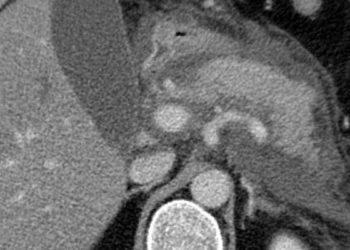Mediterranean diet linked to reduced diabetes risk in high risk cardiovascular patients
Image: PD
1. Among patients at high risk of developing cardiovascular disease, adhering to a Mediterranean diet without altering calorie consumption or physical activity reduces risk of developing new-onset diabetes when compared with a simple low-fat diet .
2. A Mediterranean diet enriched with extra-virgin olive oil is superior to the same diet supplemented with mixed nuts.
Evidence Rating Level: 2 (Good)
Study Rundown: Studies have shown that diabetes can be prevented with lifestyle changes, in particular with weight loss through calorie restriction and physical activity. However, whether altering dietary patterns without promoting calorie restriction, increased physical activity, or weight loss also reduces diabetes risk remains unknown. Prospective epidemiologic studies have suggested that the Mediterranean diet, characterized by high consumption of fruit, vegetables, whole grains, and fish with reduced consumption of red and processed meat, sugar-sweetened beverages, and starchy foods may decrease the incidence of diabetes, though large randomized trials have not been conducted. This study randomly assigned older adults at risk for heart disease to a Mediterranean diet supplemented with either extra-virgin olive oil (EVOO) or mixed nuts, or to a low-fat control diet. Participants were not advised to restrict their caloric intake or increase their physical activity. The authors found that fewer patients in the Mediterranean diet groups developed diabetes after 4 years of follow-up than in the control group, with a diet supplemented with EVOO providing the most benefit. Key limitations in this study were that withdrawals were greater in the control group than in the experimental groups, and that the study population was composed of primarily older white individuals. Nonetheless, results of this study suggest that changes in dietary patterns may prevent diabetes irrespective of weight loss or physical activity efforts.
Click to read the study, published today in the Annals of Internal Medicine
Relevant Reading: Adherence to Mediterranean diet and risk of developing diabetes: prospective cohort study
In-Depth [randomized controlled trial]: This paper presents a subgroup analysis from the PREDIMED (Prevención con Dieta Mediterránea) study, a multicenter randomized primary cardiovascular prevention trial conducted in Spain. Participants in this trial were community-dwelling men (aged 55-80) and women (aged 60-80 years) without CVD at baseline who had either type 2 diabetes or at least 3 or more cardiovascular risk factors. Patients were enrolled from 2003 to 2009 and randomized to 1 of 3 nutrition interventions in a 1:1:1 ratio: a Mediterranean diet supplemented with EVOO, a Mediterranean diet supplemented with mixed nuts, or a control diet in which patients were advised to reduce their fat intake. The end point of this study was new-onset diabetes, with follow-up assessments performed at 1, 3, 5, and 7 years after enrollment.
Among the 7447 participants enrolled in the PREDIMED trial, 3833 did not have diabetes at baseline, and 3541 had available information at follow-up to determine new cases of diabetes. Baseline characteristics were similar between groups in terms of age, gender distribution, and cardiovascular risk factors. Participants were followed for a median of 4.1 years after enrollment. Diet adherence questionnaires confirmed that patients in the dietary groups had altered their eating to meet Mediterranean diet standards. During the course of follow-up, 273 participants developed new-onset diabetes: 80 in the Mediterranean diet with EVOO group (6.9%), 92 in the Mediterranean diet with mixed nuts group (7.4%) and 101 in the control group (8.8%). Unadjusted HR’s for diabetes (when compared with the control group) were 0.69 (95% CI, 0.52 to 0.92) for the Mediterranean diet with EVOO group and 0.81 (CI, 0.61 to 1.08) for the mixed nuts group. When both Mediterranean diet groups were merged, a 30% relative risk reduction versus control was seen (HR 0.70 [CI, 0.54 to 0.92]). Changes in body weight, waist circumference, and physical activity over the course of follow-up were minor and did not differ by study group. 10.5% of patients in the control group were lost to follow-up after 2 years, versus 4.1% and 6.9% in the Mediterranean diet with EVOO and mixed nuts groups, respectively.
By Sarah Chuzi and Aimee Li, MD
©2012-2014 2minutemedicine.com. All rights reserved. No works may be reproduced without written consent from 2minutemedicine.com. Disclaimer: We present factual information directly from peer reviewed medical journals. No post should be construed as medical advice and is not intended as such by the authors or by 2minutemedicine.com. PLEASE SEE A HEALTHCARE PROVIDER IN YOUR AREA IF YOU SEEK MEDICAL ADVICE OF ANY SORT. Content is produced in accordance with fair use copyrights solely and strictly for the purpose of teaching, news and criticism. No benefit, monetary or otherwise, is realized by any participants or the owner of this domain.








